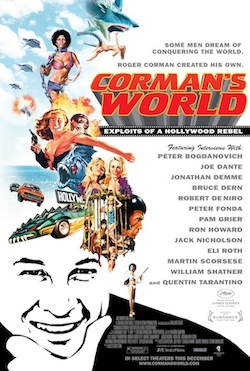A Brief Chat with the One and Only Roger Corman

Chances are that if you love movies you know who Roger Corman is. If you're not sure, however, about all the things that he's accomplished in his nearly sixty-year career, you may want to check out his page at IMDb--but please be warned that you may experience wrist and hand fatigue as you scroll through his filmography. In support of the new documentary Corman's World, the filmmaking legend was graciously able to squeeze in a few minutes so that we could talk indie filmmaking and exploitation flicks, past and present.
ScreenAnarchy: At one point in Corman's World Ron Howard says that exploitation films bring out the child in all of us...
Roger Corman: [chuckles softly]
ScreenAnarchy: ...and I just loved that. But what are your thoughts or reaction to that idea?
Roger Corman: Well, I would give a variation on that. I think what Ron said is correct. Another way to say it is, "Exploitation films bring out the thirst for excitement."
ScreenAnarchy: And that can be very childlike. But can such a fondness be patronizing, nostalgia mixing with hipsterism? Implying that these films weren't made with a seriousness and for adults? Or is there a counterargument to that?
Roger Corman: I don't really have a counterargument. I agree in part. Part of it is an appreciation of what has gone before. Formal history is one thing, pop history is another, and I think [Corman's World] satisfies the desire for pop history. People want to know what things were like thirty, forty years ago.
ScreenAnarchy: I agree--in fact, in speaking with the director I mentioned that the film is ostensibly about your career but ends up being about American popular cinema itself.
Roger Corman: Yes...
ScreenAnarchy: In terms of exploitation films, do you look back at the early '70s and think that was a unique historical moment--that exploitation films in a pure sense can never be made again? I'm thinking of the film Grindhouse...
Roger Corman: [nods] Oh, yes.
ScreenAnarchy: --films like that can't authentically capture the flavor of the period, can they?
Roger Corman: I would agree. I think there have been a number of films that attempt to recreate what we were doing. But this is a different time, a different age. And so a different kind of exploitation film can be made... because I think a lot of [the '70s exploitation films] came out of the anti-establishment of the '60s, which allowed the filmmakers more freedom. The young audience was looking for a sort of radical type of film that did not represent the establishment.
ScreenAnarchy: Yet today a lot of "indie films" are hardly anti-establishment--they're simply one entertainment niche within the establishment. But are there any current filmmakers whom you would point to as having that kind of critical-of-society spirit in their work?
Roger Corman: I can't answer that with referring to any great number of films. I can cite one person--Christopher Nolan. With Memento I looked at that when I first saw it and I thought, "This is a new version of the type of film we were making--but it's better than most of them." I really like Memento, I thought it was a very good film. It had some of the qualities that we had, but it was not like Grindhouse: it was not trying to go back, it was dealing with today. And then I think with Inception he had a very similar thing but on a big-budget science-fiction film. But some of the [same] thoughts are there.
ScreenAnarchy: What are some of those common elements with your work, either in spirit or in theme?
Roger Corman: With Memento there was a feeling of cinema verité, of going into the street to shoot the way we were shooting, particularly in the '60s. And in Inception, moving to a science-fiction context--but not just spaceships shooting at each other, there was a lot of thought behind it. A very, very complex picture.
ScreenAnarchy: Definitely, but on a big budget, as you say. What about technology and indie filmmaking over the past decade? The revolution where an HD camera for a beginning filmmaker can basically...
Roger Corman: [smiling] Yes...
ScreenAnarchy: --well, shoot something that's theater-ready without any film processing and so forth. That lowers barriers, and then you've also got guys who can do amazing visual effects out of their laptops.
Roger Corman: Yeah...
ScreenAnarchy: Those seem like positive events but is there a negative side, too? Is there something to be said when it was actually harder to make movies, in having something for beginning filmmakers to push against?
Roger Corman: To me, these developments are positive. They allow the independent filmmaker, particularly the filmmaker with limited resources, to make a film for very, very little money. The digital cameras, the ability to cut on your computer, to do effects on your computer, bring all the tools (or almost all the tools) of filmmaking within the possibility of an independent, young person--or an older person who is possibly just starting out or is just working with a small amount of money. I think these are great tools to work with. If there's any negative, the negative would be in the special effects department where I see some films [in which] the narrative is becoming secondary to the special effects when the special effects should serve the narrative.

ScreenAnarchy: Agreed. And not that I'm trying to get you to say anything controversial [smiles]... but along the lines of Robert Frost stating that modern poetry is like playing tennis without a net, isn't it good for artists to have some constraints? The early '70s had an expansion of what was acceptable in terms of sex and violence, but it wasn't a total expansion like there is today. Was it helpful to have that kind of societal lid on things back then--does that make sense?
Roger Corman: It makes sense, and I can answer with a true story. This happened in the UCLA Art Department a number of years ago. As an experiment in one class the professor divided the class at random into two groups. And to one group he said, "You are free to paint anything you want for your final examination (or your final paper)." The other half he gave almost impossible limitations that said "You must do this" and "This is the limit here." And then he sent all the paintings without saying anything about them to a professor at the USC Art Department to grade. That professor almost unanimously gave higher grades to the paintings done with the strict limitations.
ScreenAnarchy: Interesting--and I think that anecdote speaks to what Alex Stapleton told me about the theme in Corman's World of encouraging young artists, of making sure they aren't daunted by the limitations out there. Was there anything in the film's emphases that surprised you?
Roger Corman: Well, there was one thing that impressed me emotionally, and that was Jack Nicholson's recollection of our working together. I--I was really touched by that. As for the choices in the film, I felt that they were, by and large, good. The references to a somewhat insane picture, The Terror, and to a Russian science-fiction picture about Venus [Voyage to the Planet of Prehistoric Women]--I felt those could have been tighter because they were minor pictures. But on the other hand, they were entertaining...
ScreenAnarchy: Yes.
Roger Corman: And I can see why Alex put them in.
ScreenAnarchy: There's a nice play between those kinds of films and the more serious-minded fare like The Intruder. But I could tell when I was watching Corman's World that some people in the audience were very surprised by your role in distributing films by the great European filmmakers of the era. Can you comment--from any perspective, as a filmmaker yourself or as a fan even--on the demarcation between highbrow and lowbrow in our culture? Why do so many find it odd that some people can love both?
Roger Corman: My comment on that is that there's a whole world of cinema... and it's all cinema. And there's room for every type of cinema. I think about the community of us as filmmakers, each working in our own individual way but we're all working in the world of cinema. And the distinction between high art and pop art is increasingly blurred--that distinction is almost gone.
***
Corman's World opens in theaters today.







